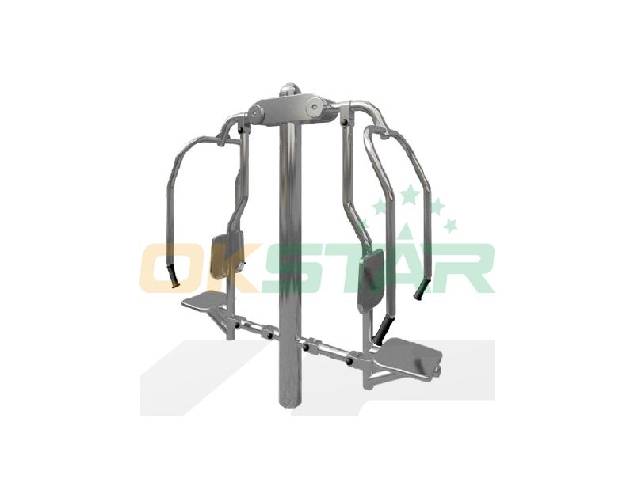Judging by some people who do bench presses on chest training days, building pectoral muscles is the top priority of any aspiring bodybuilder. Judging by the fact that most diligent trainers have not made significant progress, it can be said that what they lack is not hard work but training skills, which can take years of concentrated effort to learn. Here the Chest Press Company will introduce a practical, incredibly effective method to help everyone's chest training make the most progress: Arnold's chest training 6 rules.
You must have heard more than once that you should do compound movements at the beginning of training, and you can be sure that this is also the motto of chest training. Both the press and the bird moves will exercise the chest, but you can use a lot of weight to increase the burden on the chest muscles. However, when doing single-joint training like flying birds, you should limit your weight to prevent shoulder joint injuries at the bottom of the movement. Since the referral can use high weight, it is the best action at the beginning of training.
Most people like to do bench press first, which I also agree with. The bench press impacts the most part of the chest muscles, and the use of barbells can lift high weights, and the risk of injury is minimal. If you choose to do the bench press at the beginning, you should know how to get more in this exercise. After 3 to 4 warm-up groups (muscles have not reached exhaustion), choose a weight that can do up to 6 times in each group. At this time, the weight of the recommendation should be very large, because at this time you have the greatest strength and you can return to the best state after warming up, and you will not be able to do 2-3 training. If you use high weights in the middle or at the end of your chest training, you cannot gather 100% of your strength.

Chest Press
Flat bench press is very effective for training the middle part of the chest. However, if you want to develop a balanced chest, you must also focus on training the upper and lower parts of the chest. Therefore, the next exercise (the next two exercises for more advanced bodybuilders) should be done on the adjustable bench for uphill or downhill presses. The upward oblique press focuses on exercising the upper chest muscles. When doing uphill presses, the angle of the stool should be quite low, because the higher the lift, the greater the effect of the relatively weak front deltoid muscle. If you feel a burning sensation in the front of the deltoid after a set of upward oblique presses, it means that they are fatigued before the upper pectoral muscles. In this case, you should lower the angle of the stool and focus on exercising the upper pectoral muscles.
Conversely, the oblique press has little dependence on the deltoid muscle, and the smaller the range of the action, the greater the weight that can be lifted. When doing these two exercises, you must pay attention to keeping your body in the correct position. Therefore, a good assistant can not only help you remove the barbell bolts, but also assist you in the last few times.
Some trainers arrange the equipment at the beginning and the end of training. Chest Press is indeed very effective. However, free weight training should be done at the beginning of training because these trainings can have the greatest impact on the muscles. When fatigue begins (it may be the third or fourth movement for intermediate and advanced exercisers), it is time to do equipment training.
To put it simply, you only need to use the machine to press, and you don't have to worry about balance like a barbell or dumbbell. Now that your muscles are exhausted, you can safely lift the weight that reaches the absolute limit, without worrying about the weight being stuck on it or pressing on yourself.
By now, you should be able to feel the good development of the chest, and it is time for you to successfully complete the training. At this time, single-joint movements should be added to the training program. Although you can't load too much weight during separation training, the focus should be almost entirely on the muscles being trained, which means that the effect of the front deltoid and triceps should be minimized.
The key to correct single-joint training of the chest is to keep the elbow slightly bent during the whole set of training. The elbows are bent and extended during the press, but the elbows should be locked during bird training. Keep your elbows in this position until all reps are completed.
If you have been training for a month or two, then you may have entered a stage of progress, no matter how hard you work, there is not much progress. The solution to stagnation is not to increase intensity but to try differently. Don't always do the barbell bench press at the beginning of the training, occasionally start with dumbbell bench press or incline up or down press. When changing the initial movements of the training program (but keep the number of sets and times unchanged), you should also change the two movements so that the same movements and equipment will not be repeated.
According to the Chest Press Supplier, these 6 chest training rules are very effective. If you use a variety of movements and repetition ranges, it can also help build strength and muscle mass.